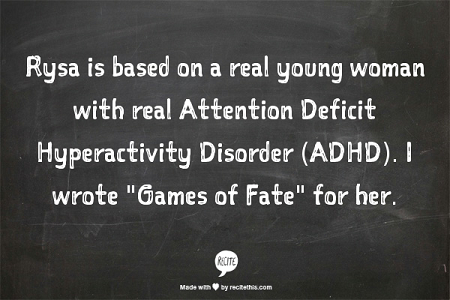Today we get to spend some time with Kris Austen Radcliffe as she interviews the individuals upon whom Rysa, the main character from her Fate~Fire~Shifter~Dragon series. Enjoy!
Note: The Me: (interviewer) is author Kris Austen Radcliffe.
Girls with ADHD aren’t, for the most part, “heroine” material. They suffer self-esteem issues. They tend to bounce and be annoying. They can’t hold focus. Who would want to follow such a girl into battle? But, like my daughter, they can be strong, smart, and willing to save the world.
My daughter recently returned to her college campus to start her sophomore year, but today, she asked to share her real world with the readers of her fictional self.
Me: Welcome, ladies. Should we start with the basics?
Kitsu: Sounds about right.
Me: How would you describe Attention Deficit Hyperactivity Disorder?
Me: When I was in grad school and I taught psychology to student teachers, we touched on the neuropsychology of the executive functions located in the frontal lobes just above the eyes. ADHD appears to be connected to differences in frontal lobe processing, at least for some individuals.
Kitsu: I don’t have ADHD, but I do have other issues that help me understand Rysa’s character. Many parts of social anxiety feel very much like not being able to filter, though on a more person-to-person level than person-to-world.
Suzu: The fact that I have to consciously compensate for my lack of filters really hurts my working memory.
Suzu: As my grades showed.
Kitsu: Social anxiety does something similar. It fills up your head and you can’t think about anything else until the anxiety fades.
Suzu: I read that a lot of people with ADHD also have social anxiety. I can’t “ignore” criticism, it comes in at equal weight like everything else, and then my brain flags it as a possible threat. Once my brain’s convinced there’s a threat, my anxiety goes through the roof.
That reminds me of a story: When I was in school, especially middle school, I’d play with paper a lot. I did origami – little swans, little boxes, whatever the paper-folding fad of the day was. This time around, it was little paper “throwing stars”. I’d flip them around in my fingers so I wasn’t going crazy from being forced to sit there. Better than tapping my foot, anyway.
Suzu: Fidgets provide something I have some control over – an input I can use to “block” or “replace” other things coming into my mind from around me.
The teachers didn’t like me playing with paper. I got scolded a lot for it. But this time, it was really bad – a para pulled me out of class because I wouldn’t let them take it away from me. Apparently kids had been throwing them at each other and they were afraid of people getting hurt. I tried to tell her I was using it as a fidget and had deliberately constructed it to be harmless.
What she did next stuck with me to this day: She started screaming at me about “Well, you better have a diagnosis for that!” I freaked out. I didn’t know how to respond. I think I might have started crying. I had a diagnosis. My IEP was on file. She was there to help me because of my diagnosis but she wasn’t.
From then on, I never trusted the school again. They weren’t trying to help me. They just wanted me to be “normal” so I wouldn’t make a scene. No matter how many classes I failed, no matter how much my trust in anyone claiming to wanting to help me dwindled. They didn’t give a shit.
I was kinda nuts when I was a little kid – threw tantrums in school, that sort of thing. They kept me in the special ed room in first grade, and I spent most of my time hiding in a teepee. Thing is, I really wasn’t that bad. It’s just… my little kid brain realized the only time I actually got any help was when I was so crazy they couldn’t ignore it. And so I tried to game the system the only way a 7-year-old knew how.
Me: In my new FFSD story (Silent, available early November), I have Rysa’s friend Gavin dealing with an enhancement via his high-tech hearing aids. He’s hearing everything and it’s overpowering, especially for this young man who’s spent the last nine years of his life in semi-silence.
There’s a moment where he stops and wonders if this is how Rysa lives.
Suzu: Pretty much, yeah. But his brain is wired to sort things for him.
Kitsu: I think the vividness of Rysa’s visions show her ADHD well. They’re wild and chaotic, but she’s aware of everything in them, including the emotions.
Suzu: I can’t handle strong emotions – I get worked up, I stay worked up, and it feeds on itself until I either step away and reorient or go into overload. For me, horror fiction with lots of jump scares is a recipe for disaster. Even moments in stories where the protagonist runs into a big misunderstanding or makes a big mistake are too much a lot of the time, and I wind up skipping pages. It’s easier to handle positive emotions – they mostly make me want to run around a lot, but negative emotions are painful. And that’s not exaggerating.
Me: We noticed that when you were little. You’d hide during loud cartoons. I think that’s why you only liked “Blue’s Clues” as a child.
Kitsu: I understand the self-esteem and social anxiety issues involved with ADHD. The being too sensitive to the possibility that you’re the root of all of the problems, so to speak. Thankfully in the story, Rysa has the support of Ladon and Dragon.
Me: Unlike Suzu’s para in middle school, Ladon and Dragon don’t judge. They understand.
Suzu: Not everyone understands.
Kitsu: Or wants to make the effort to understand.
Kitsu: I want to say right now that Suzu and I asked Ms. Radcliffe to write a response to a few points we felt needed to be addressed.
Me: What would you like to say?
Suzu: A lot of people seem to be asking why Rysa doesn’t just get over her ADHD. Why do you have to keep writing it like that? Why doesn’t the character calm down and stop having vivid visions? It seems to make some readers mad.
You can’t just get over it. Imagine it this way: You see something as orange, and everyone around you keeps telling you it’s red. They call you crazy, laugh at you, because you just aren’t seeing it right. They tell you that you just need to work harder. And every time you’re told this, you start to slide a little more into thinking they’re correct. That you’re a broken, stupid, crazy person. And all those little incidents become too much to bear and you’re sitting in the bathroom crying because going out there is just too much. That’s ADHD.
Suzu: My life is alien to most people. I get it. But Rysa is an opportunity for others to understand. It would be helpful to girls like me if other people tried not to judge.
Me: I understand being annoyed by a character who is frantic all the time, if that character is without issues. But Rysa carries a diagnosis.
Suzu: When Rysa’s thoughts are called invalid by saying she needs to “get over it,” or more horrifically, by saying her emotional responses to Ladon are invalid because a college student would never act that way, the character is invalidated.
Saying that Rysa’s responses to her situation can only happen because of the actions of another character – that a realistic character could only be traumatized by abuse or rape at the hands of her ex-boyfriend – is saying that the Rysa’s character is invalid. Her disability is discounted and waved away as something fake. Her emotions and her thoughts could not possibly be those of a legitimate person.
From upstairs, Mr. Radcliffe, who is listening in on this conversation, chimes in: People drop out of school all the time because people in their lives pass away. All the time. If you want, I’ll put you in contact with one of our student counselors.
Me: I thought a dead ex-boyfriend was pretty darned traumatic. Rysa and Ladon spend almost an entire emotional chapter discussing how her ex’s death affects her.
Kitsu: It is traumatic. Commenting that abuse is necessary is disgusting. Insinuating that a woman needs to be raped in order to be traumatized makes me physically ill.
Kitsu: Uh-huh.
Suzu: We thought that the question of Rysa’s agency needed to be addressed in a wider sense. It touches on all the issues of ADHD and that particular view that it’s an invalid disorder.
Me: I may be a tad oversensitive, but I see young women with ADHD as a vulnerable population. But that’s a mom’s eye view. It is, though, why I agreed to do this.
Kitsu: We’d like to talk about something else, too.
Suzu: Yes.
Kitsu: Rysa’s sexuality is not subtext for how “good girls can’t have sex.”
Kitsu: The way I read it, Rysa consciously resists touching him because of her anxiety, and unconsciously doesn’t resist because she’s, well, not thinking about how afraid she is when she’s in a vision. She’s concentrating on their connection.
Me: Ah. (grins) See, this is why I pay Suzu’s college tuition. You both have a better understanding of how to read texts than those of us with film degrees and graduate work in psychology.
Suzu: It’s because of the internet.
Kitsu: We play a lot of games. We like to rip the worlds of those games apart, analyze them, and put them back together.
Me: (laughs) That, you do.
Me: I am. After talking with the two of you, I’m beginning to wonder how Ladon’s responses to Rysa could be seen in the same invalidating light, even though they are just as real to his PTSD as hers are to her ADHD.
Suzu: Something to think about for another day?
Me: Yes. Thank you, both of you. Thank you for doing this. If it helps just one person, it’s been worth it.
Kitsu: Yes. You’re welcome.
A bit about Kris Austen Radcliffe:
Kris lives in Minnesota with her husband, two daughters, and Handsome Cat. Starting April 1, 2014, she’s giving away a free e-book a day for an entire year. Join her newsletter to enter.



No comments:
Post a Comment